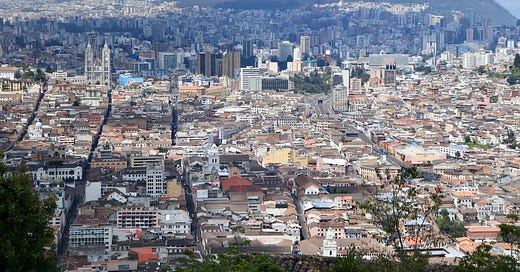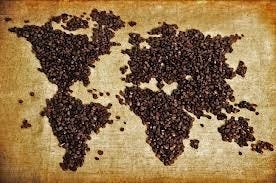Emerging Markets Daily - July 25
World Food Supplies Slammed, China Defying U.S Pressure, Indonesia Extends Restrictions Amid Covid Wave, Ecuador Shrimp, Africa Watchmakers
The Top 5 Emerging Markets Stories from Global Media - July 25
World Food Supplies Slammed by Drought, Floods, and Frost
Bloomberg
“Extreme weather is slamming crops across the globe, bringing with it the threat of further food inflation at a time costs are already hovering near the highest in a decade and hunger is on the rise.”
“Brazil’s worst frost in two decades brought a deadly blow to young coffee trees in the world’s biggest grower. Flooding in China’s key pork region inundated farms and raised the threat of animal disease. Scorching heat and drought crushed crops on both sides of the U.S.-Canada border. And in Europe, torrential rains sparked the risk of fungal diseases for grains and stalled tractors in soaked fields.”
“Coffee’s the biggest recent mover, with prices surging 17% this week week and topping $2 a pound for the first time since 2014. But the recent frost in Brazil is just the latest example of woes that have struck farmers there this year. Brazil’s also experiencing a crippling drought that depleted reservoirs needed for irrigation.”
“The series of misfortunes underscores what scientists have been warning about for years: Climate change and its associated weather volatility will make it increasingly harder to produce enough food for the world, with the poorest nations typically feeling the hardest blow. In some cases, social and political unrest follows.”
“The Food Price Index from the UN’s Food and Agriculture Organization rose for 12 consecutive months through May before easing in June to 124.6 points, still up 34% from a year earlier. The index measures international prices of a basket of food commodities.”
“No other industry is more at the mercy of sun, rain and heat than agriculture, where changes in the weather can upend a farmer’s fortunes overnight. It’s also an industry that’s become extremely globalized and concentrated, creating a precarious situation where an extreme weather event in one place is bound to have ripples everywhere.”
“Brazil, for example, is the world’s biggest shipper of sugar and orange juice and a key producer of corn and soybeans. It accounts for about 40% of the world’s harvest for arabica coffee, the smooth variety that shows up in your Starbucks cup.” Bloomberg Green reports.
See Also “Globalization in a Mug” - How Coffee Explains the World
China is Defying US Pressure to Change its Behaviour
Financial Times
“…The latest salvo underscored the deep and growing chasm between the US and China as the countries prepared for their second top-level meeting since Joe Biden took office.”
“In his first six months in office, Biden has struck a strident tone towards China, punishing Beijing over its crackdown on freedoms in Hong Kong, its persecution of Uyghurs and other Muslim minorities in Xinjiang and its military activity near Taiwan. The president hopes this strategy, bolstered by co-ordination with allies, will help the US win what he views as an existential fight between democracies and autocracies.”
“Oriana Skylar Mastro, a China expert at Stanford University, said Biden had successfully shown China that US discontent was not limited to the previous administration in Washington. But she added that there was no sign he had convinced Chinese president Xi Jinping to change course.” Demetri Sevastopulo and Edward White report
Indonesia Extends Restrictions Amid Covid Wave
Bloomberg
“Indonesia is extending its tightest mobility curbs for another week until Aug. 2 as cases remain high following near month-long restrictions.”
“Adjustments are made in order to allow small businesses to operate under strict health protocols, President Joko Widodo said in a briefing broadcast on YouTube. Traditional markets selling staple foods will open as normal, while shops selling non-food items and small businesses are allowed to operate at half capacity at shorter trading hours. Dine-in can resume at food stalls and restaurants in outdoor areas.”
“Indonesia’s confirmed Covid-19 cases have jumped back to more than 40,000 a day after declining from over 56,000 on July 15, while fatality numbers remain at near record highs. Southeast Asia’s biggest economy has become a new global virus epicenter after exceeding Brazil and India in their daily case count earlier this month. The nation registered 38,679 more cases and 1,266 new fatalities on Sunday, according to health ministry data.” Bloomberg reports.
Ecuadorian Shrimp Go Upstream
El Pais
“The Chinese market retreated, ships were turned away midway, workers did not want to go to the industries for fear of infection, seafood consumption in the United States and Europe plummeted, and, to top it off, there was a drastic drop in prices. But even so, in 2020, despite having everything against it, not a pound of Ecuadorian shrimp was left unsold. That seafood moves one in four dollars of Ecuador's exports in a normal year and, in the midst of the pandemic, it managed to grow 7% while the whole world grappled with the coronavirus.”
“…It was the drop in world consumption, the overproduction of shrimp and the consequent drop in prices that pushed Ecuadorian companies in 2020 to improve their equation between production expenses and sales value. They also saw an opportunity to expand their presence in the United States in light of India's difficulties in supplying that market due to the problems derived from the coronavirus.” Sara Spain reports (in Spanish)
Towards Better Times for Africa’s Watchmakers
African Business
“The African luxury watch market is in its infancy but local watchmakers are building a reputation for artistry and reliability.”
“…Globally, watch sales were proving resilient even in the era of the smartphone up until the pandemic, with the global market valued at $62bn in 2020 by Business Wire, a market research company. Rising urbanisation in China and India, an expanding international middle class, and growing urban fashion consciousness in China and India, the world’s two most populous nations, had proved a bulwark to help offset dips experienced in more mature markets.”
“Still, despite the obvious buzz, the African market is in its infancy. Most African watchmakers are self-taught, with few opportunities for any formal watchmaking education on the continent. Creators first have to learn the different aspects of watch-making from online video tutorials or apprenticeships with those in connected trades – Dzamefe spent two months with a shoemaker learning how to fashion leather straps.” Will McBain reports
What We’re Also Reading…
What the U.S. Can Learn From China’s Industrial Policy Mistakes—and Successes
The Wall Street Journal
“…There is little doubt the U.S. needs more public spending on infrastructure, R&D and on training the next generation of American programmers and engineers. Supporting strategic industries with tax incentives or other means can be helpful, too, as Taiwan and South Korea have demonstrated in semiconductors. But the U.S. should avoid the trap of trying to pick winning firms directly—and of pairing state support with protectionism. In China that policy combination has often led to poor outcomes: overcapacity and low-quality firms feeding off state subsidies, rather than real technology champions.”
“…China’s experience with electric vehicles is instructive. Beijing initially focused on directly trying to build up national champions by giving EV buyers big taxpayer-funded rebates for domestically produced vehicles, as well as forcing all Chinese auto companies to invest in EV production and buy local batteries.”
“…This history holds lessons for the U.S. as it designs its own incentives to boost industries like chip-making and EVs. Throwing money at a problem can help, but what is really critical is developing clusters of top talent with the active participation of market and technology leaders.” Nathaniel Taplin reports
Japan's Horigome Crowned First Skateboarding Olympic Champion
Korea Times
“Japanese world champion Yuto Horigome held his nerve to be crowned skateboarding's first Olympic gold medalist after winning a tense street competition in Tokyo on Sunday.”
“The 22-year-old, who grew up just a stone's throw from the Olympic venue, landed three huge tricks in a row to eclipse American favourite Nyjah Huston, who imploded to finish seventh.”
“…Olympic competition crowns a long journey for the counter-culture pursuit, which emerged as "sidewalk surfing" ― an alternative to surfing ― in California in the 1950s.”
“After decades of organic growth, skateboarding was included in the inaugural X-Games, created by broadcaster ESPN, in 1995, paving the way for an increasingly slick and organised sport.” Korea Times reports




